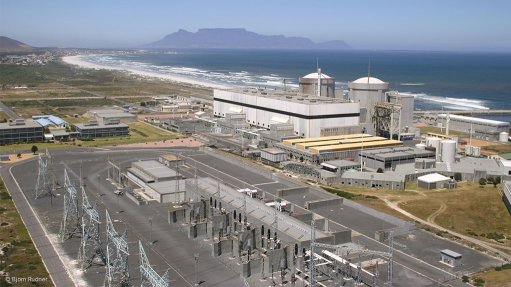
State-owned electricity utility Eskom has confirmed that Unit 1 at the Koeberg nuclear power station, in the Western Cape, is currently scheduled to return to service only on November 3.
The unit entered an extended outage on December 10 last year, which was initially scheduled to be completed in 180 days and returned to service in June.
The scope of the outage includes the replacement of the unit’s three steam generators, a key requirement for a planned 20-year life extension of the plant, the licence for which is currently due to expire on July 21, 2024.
In March, Eskom confirmed that the initial Unit 1 return-to-service date was no longer achievable but that it would be reintroduced before Koeberg Unit 2 was shut in September for a similar long-duration outage.
Reports subsequently emerged of a further outage slip. These led Electricity Minister Dr Kgosientsho Ramokgopa to warn that there was a possibility that there could be a period when both units were unavailable simultaneously, which would increase the risk of loadshedding.
Speaking during a webinar organised by Western Cape Premier Alan Winde, Eskom chief nuclear officer Keith Featherstone confirmed that November 3 had been set as the official date for bringing Unit 1 back online.
However, he said that every effort was being made to achieve that milestone sooner, attributing the delay to an “unrealistic” initial assessment of the length of time it would take to remove and replace the three Unit 1 steam generators.
He also reported that the Unit 2 outage, which would also involve the replacement of three steam generators, was scheduled for November 7.
Eskom is seeking to secure a separation of Unit 2’s licence to reflect the fact that it entered into commercial operation more than a year after Unit 1 and should, thus, be allowed to continue to operate beyond July next year.
Should the National Nuclear Regulator (NNR) refuse the request and the Unit 2 outage takes as long as the Unit 1 outage, Unit 2 will be out of service by the time the current bundled Koeberg licence expires.
Featherstone confirmed that the application for the licence separation had been submitted to the NNR, which had requested additional information before making a determination.
He noted that, while Unit 1 entered into commercial operation in July 1984, Unit 2 followed nearly a year-and-a-half later in November 1985.
While making a distinction between the outages and Eskom’s application for a Long-Term Operation licence for a further 20 years, Featherstone nevertheless confirmed that the lack of certainty over whether or not the licence would be approved had precipitated Koeberg scheduling another 200-day outage in July next year for Unit 1.
Should the licence be approved before that date, the period could be significantly reduced, as only a containment building leak test was currently scheduled to take place during that outage and 200 days would not be required to complete such a test.